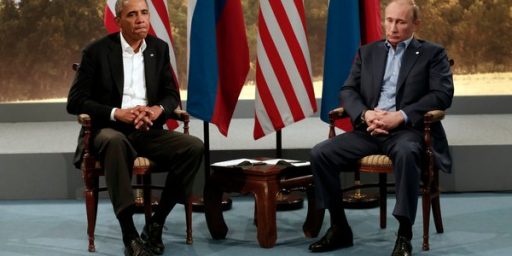Damascus Attack Kills Key Members Of Syrian Government
Several key members of the Syrian government were killed in a suicide bomb attack today in Damascus.
The rebels fighting the government of Syria have scored a victory that could be a turning point in the 17 month civil war that has been ravaging the country:
BEIRUT, Lebanon — An explosion that Syria state television called a suicide bomb attack killed at least three top aides to President Bashar al-Assadof Syria on Wednesday including the defense minister and Mr. Assad’s powerful brother-in-law. The blast in Damascus, after three days of fighting in the capital, hit at the very military structure that has been directing the harsh repression of the 17-month-old uprising against Mr. Assad’s rule.
The assassinations were the first of such high-ranking members of the elite since the revolt began and could represent a turning point in the conflict, analysts said. The nature and target of the attack strengthened the opposition’s claims that its forces have been marshaling strength to strike at the close-knit centers of state power.
President Assad made no public statement about the attack and his whereabouts was not immediately clear.
The attack seemed to heighten tensions between government soldiers and the opposition, with fierce clashes reported in several Damascus neighborhoods. There was also a rash of reported defections from the government side.
According to state television, the dead included the defense minister, Daoud Rajha; Asef Shawkat, the president’s brother-in-law who was the deputy chief of staff of the Syrian military; and Hassan Turkmani, a former minister of defense and military adviser to Vice President Farouk Sharaa.
But the television report rejected claims by Arab satellite channels that the minister of the interior, Mohamed Sha’ar, also was killed, saying he was injured and in stable condition.
General Rajha was appointed minister of defense in August. A Christian, he was one of the prominent minority figures used by the Assad government to put a face of pluralism on the military and security services dominated by the president’s Alawite sect.
The British-based Syrian Observatory for Human Rights, an anti-Assad activist organization, said all the members of the crisis group set up by President Assad to try to put down the revolt were are either dead or injured. State television said that besides the three dead and the injured interior minister, the only other injured was Hisham Ikhtiar, head of the general security bureau.
The government moved rapidly to project an image of control, naming Gen. Fahed Jassem al-Freij, the military chief of staff and a man once assigned to subdue restive Idlib province in the north, as the new minister of defense. In a statement read by General Freij on state television, he said the military would not be deterred from “cutting off every hand that harms the security of the homeland and citizens.”
At the Pentagon, Defense Secretary Leon E. Panetta said that situation in Syria “is rapidly spinning out of control” and warned Mr. Assad’s government to safeguard its large stockpile of chemical weapons. “It’s obvious what is happening in Syria is a real escalation of the fighting,” he said at a joint news conference with the British defense minister, Philip Hammond.
The attack came as diplomatic maneuvers to seek a cease-fire remained deadlocked by differences between Syria’s international adversaries and sponsors, principally Russia, ahead of a United Nations Security Council vote on a Western-sponsored resolution that would threaten Mr. Assad’s government with economic sanctions if it does not implement a peace plan negotiated by the special envoy Kofi Annan more than three months ago. The resolution, which Russia has threatened to veto, would also extend the mission of 300 unarmed United Nations monitors, whose work has been suspended because of the violence.
There’s also a report, sent via Twitter by a Syrian activist, that Assad himself was wounded in the attack and transferred to a hospital outside Damascus. That report hasn’t been picked up by the news media, yet, but even if it isn’t true this is clearly the most substantial attack against the government since the conflict began and likely to send a message to Assad that he’s not necessarily safe anymore. How he responds to that is another question. There have been reports over the past several days, for example, that the regime is taking steps to move its chemical weapons stockpiles, a sign that they may be considering using them on the rebels and protesters as part of some last desperate attempt to hold onto power.
In his statement today, Secretary of Defense Panetta cautioned Syria about the use of chemical weapons:
U.S. Defense Secretary Leon Panetta made an urgent call Wednesday for Syrian President Bashar al-Assad to step down amid an escalation of violence “rapidly spinning out of control.”
“It’s obvious that what is happening in Syria represents a real escalation in the fighting,” Panetta told reporters at a joint news conference with his British counterpart Philip Hammond, who agreed with the Pentagon chief’s assessment, according to AFP.
“All of the concerns that we’ve expressed for the need for Assad to step down, the need for a peaceful transition, the need to achieve a peaceful solution to that situation… by ignoring those appeals by the international community… the violence there has only gotten worse and the loss of lives has only increased.”
(…)
Panetta and Hammond both cautioned the Assad regime not to lose control of its chemical weapons.
“We will not tolerate the use or the proliferation of those chemical weapons,” Hammond said.
Indeed, I would imagine that use of chemical weapons may be the event that causes the world to act against Assad whether they want to or not. It would change the moral equations involved significantly and, more importantly, raise the danger that Syria may turn such weapons on nations like Turkey which it has accused of aiding the rebels. This is a long shot, no doubt, and the fact that we didn’t see the Libyan regime take similar moves when their regime was collapsing suggests that the fear of intervention in the wake of the use of weapons of mass destruction is sufficient to restrain even the most megalomaniacal dictator.
With regard to today’s events, though, Jeffrey Goldberg weighs in with a timely note of caution:
[W]e should remember that suicide bombing is a leading indicator of societal collapse. And, as Max Boot points out in a perceptive post, this attack is perhaps a sign of direct involvement by al Qaeda, or an al Qaeda-affiliated group. I don’t think we should start labeling Sunni extremists of the al Qaeda type “martyrs.” We extolled similar men in the 1980s in Afghanistan, and we wound-up regretting that bout of glorification as well. Today’s suicide bombers, just like yesterday’s Afghan mujahideen, are all thrust, no vector; I don’t think it is unfair to speculate that the men who organized today’s suicide bombing will not one day organize a similar bombing against a Western target.
There’s no mourning necessary for the men who died, they were part of the leadership of a regime that has oppressed its people for decades and has spent the last year and a half brutally murdering its citizens. However, Goldberg has a point here, a post-Assad Syria could very easily become the breeding ground for a whole new round of suicide bombers. Given the nation’s proximity to the strongholds of Hezbollah and Hamas, it’s not at all inconceivable that both groups would see an opportunity in the chaos that could result from a sudden collapse of the regime. Add in to that the fact that Syria borders Israel, which is already nervously looking to its east at a new Egyptian political order that may or may not be trustworthy, and you”ve got all the ingredients for regional chaos and conflict.
At this point, the ideal situation would be for the Russians to do what they can to push Assad out of power, but they don’t seem to be inclined to take a stand against Assad or to even allow regime change in Syria to take place. We’re at the point, though, where either the regime will change, or Assad will strike out even more violently than it already has, which may well cause the West to step in whether Russia likes it or not.






Reminds me oddly of Batista in Cuba. One minute Fidel was out in the mountains, the next minute he was in the city. Once that happens it’s time to think exile. Surely Assad has stolen at least a billion dollars. Time for a very extended visit to Iran or Russia.
So… is the suicide bomber a freedom fighter or a terrorist?
In any case, Assad is on his way out.
I think it’s probably silly to try and wedge this into a good guys/bad guys narrative. Shia vs. Sunni? I don’t mean to imply a Godwin’s violation, here, but it’s a bit of Nazis vs. Soviets. There’s no reason to suppose there’s a hero, but I guess we’d rather see the anti-Assad side prevail simply on the grounds of screwing Iran and Russia.
The suicide bomb was apparently not a suicide bomb at all which changes everything. The Russians now realize that Assad is going down and it will be interesting to see how they respond. I would hope we are talking to Russia about getting a handle on the chemical weapons before the bad guys do and make no mistake whoever takes Assad’s place will be a bad guy.
@michael reynolds:
He and his family were offered exile in the UAE if they gave up power, but that was months ago. Perhaps he could take the route Idi Amin did and head to Saudi Arabia, but then the Saudis have been arming the rebels so that might not work out too well either
They’re only terrorists when a cracker dies. Otherwise it’s all good.
In the Russian language news media the attack is being described as an act of suicide terrorism. I haven’t run across a great deal of commentary on it there. I think we should be cautious in thinking of this as a “game-changer”. From the Russian point-of-view it changes nothing. They’re still portraying the conflict in Syria as a U. S.-Israel fomented uprising.
@Dave Schuler: I suspect that’s for public consumption.
@Dave Schuler:
As I’ve noted here before, the Russians have many motivations regarding their position on the Syria issue. Part of it, no doubt, involves opposing the West but there’s also issues involving the safety of Syria’s Christian community, which has been a concern of the Russian Orthodox Church, and the fact that there is apparently a not insubstantial population of Russians living in Syria in mixed marriages.
Even taking all of that into account, though, I cannot believe that Putin is a stupid man and even he must realize the dangers presented by a sudden collapse in Damascus, especially as it concerns the fate of Syria’s WMD stockpile.
Or, at least that’s my take on the rational way the world’s actors should be looking at this. I don’t support intervention in Syria, but we may be approaching a point where there is no other choice.
@Ron Beasley:
Unfortunately, that’s all I’ve got. BTW, my remarks above are not analysis; they’re reporting. I’ve looked at all of the Russian language sources I can put my hands on and that’s a summary of what they’re saying.
@Doug Mataconis: I agree Doug. I have seen reports that the US and Russia are already talking about a transition and securing the WMD. I would imagine that all Russia is really interested in is maintaining their Naval base and could care less about Assad.
@Dave Schuler: As I said above the Russians want to maintain their Naval presence. I little face saving would probably also be necessary. An unstable Syria is not in Russia’s best interest either.
@Ron Beasley:
There was also a report about a month ago (tried to find the link but there’s so much Syria stuff in Google’s news feeds it’s hard to locate) that the U.S. and Jordan were engaged in joint training exercises designed to work out scenarios for securing the WMDs in the event of a collapse in Damascus.
You’d almost have to think this is a matter of course. Heck, I’d hope that somewhere in the Pentagon there’s a plan for securing Pakistan’s nuclear weapons if the shit hits the fan there.
@Doug Mataconis: I would think that now it would be a good idea to include Russia. They certainly have an interest in keeping WMD out of the hands of Islamic terrorists and may be in a better position to do something about it since they already have a military presence there.
Oddly this bombing only missed by two days occurring on the anniversary of the attempt on Adolf Hitler’s life in the Wolf’s Lair. The loss of faith in the German security apparatus and in the High Command seem like repeatable consequences. This can only speed up the destruction of the Assad’s.
Dontcha hate it when Schuler goes all, “I read Russian” on us?
Start talking Star Trek and he’ll probably throw down some Klingon.
It is the fastest growing artificially-created language.